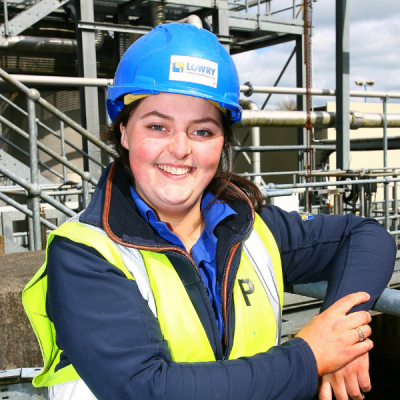Ability to make decisions, strong communication and people skills, plus good time management are key to Matilda May Beattie’s role as an apprentice civil engineer at Lowry Building & Civil engineering.
Find out how she became an apprentice civil engineer at Lowry Building & Civil Engineering (LBCE)
Give a brief outline of your career to date.
In June of 2017, I started at LBCE on a six month placement as part of my foundation degree at South West College, Omagh. After the placement finished I continued with LBCE on a two day a week placement. Following this, I was offered an apprenticeship with Ulster University to further my studies. Currently I study one day a week and work for LBCE four days a week. This is ideal for me as I like having an income whilst at the same time furthering my education.
What was your favourite subject at school?
I always enjoyed Maths at school as I enjoy solving problems. My mother is a maths teacher so that may have had an impact.
Did you go on to further/ higher education, if so what did you study and where?
I left school after completing my AS-levels and went to the South West College in Omagh to do a foundation degree in civil engineering.
How did you get into your area of work?
From growing up on a farm I always knew I did not want to have a job where I was always sitting in an office. I enjoy being outside, and after doing my BTEC in construction I decided to become a civil engineer.
Were there any particular essential qualifications or experience needed?
It depends on the area of construction you want to work in. Personally, the BTECS and degree have been invaluable whilst I ‘learn on the job’ with LBCE . A keen interest in the construction industry is also helpful.
Are there alternative routes into the job?
You can go straight to university and do a degree in civil engineering. I chose to do the foundation degree and apprenticeship as it was the best option for me.
What are the main personal skills your job requires?
Being able to make decisions, strong communication and people skills, plus good time management.
What does a typical day entail?
A typical day includes drawing up estimates for jobs, as well as making sure staff are on site and ensuring they have any the materials and equipment they need to do the job. Looking after health and safety, carrying out inductions with everyone on site. Plus going to meetings with the client and design teams.
Why is what you do important?
I look after the health and safety on site, which is an extremely important part in construction. I am a link between the client and staff and need to make sure both are up-to-date.
How has Covid-19 impacted your business/ role?
When Covid-19 hit I was off work on furlough for three months. Since coming back to work we have had to provide extra welfare facilities onsite to maximise social distancing and ensure staff have access to equipment such as hand sanitiser.
What adjustments have you had to make?
I no longer need to physically be at meetings as this has all moved online. This means less time travelling and more time on site with staff.
And finally, what’s the key to any successful job search?
If you are considering a job in construction get in contact with relevant people and talk to them about it, be persistent and ensure to follow up with a phone call or email. Talk to organisations like the Construction Industry Training Board NI (CITB NI) who can help guide you in the right direction.
For more information on apprenticeships within the construction industry visit www.citbni.org.uk
Keep up to date with the latest news and views on the NI job market and more by following the nijobfinder blog.
Follow nijobfinder on Facebook, Twitter and LinkedIn to see the latest jobs and to ensure your dream job won’t pass you by.
How I became | Apprentices| Construction Sector


